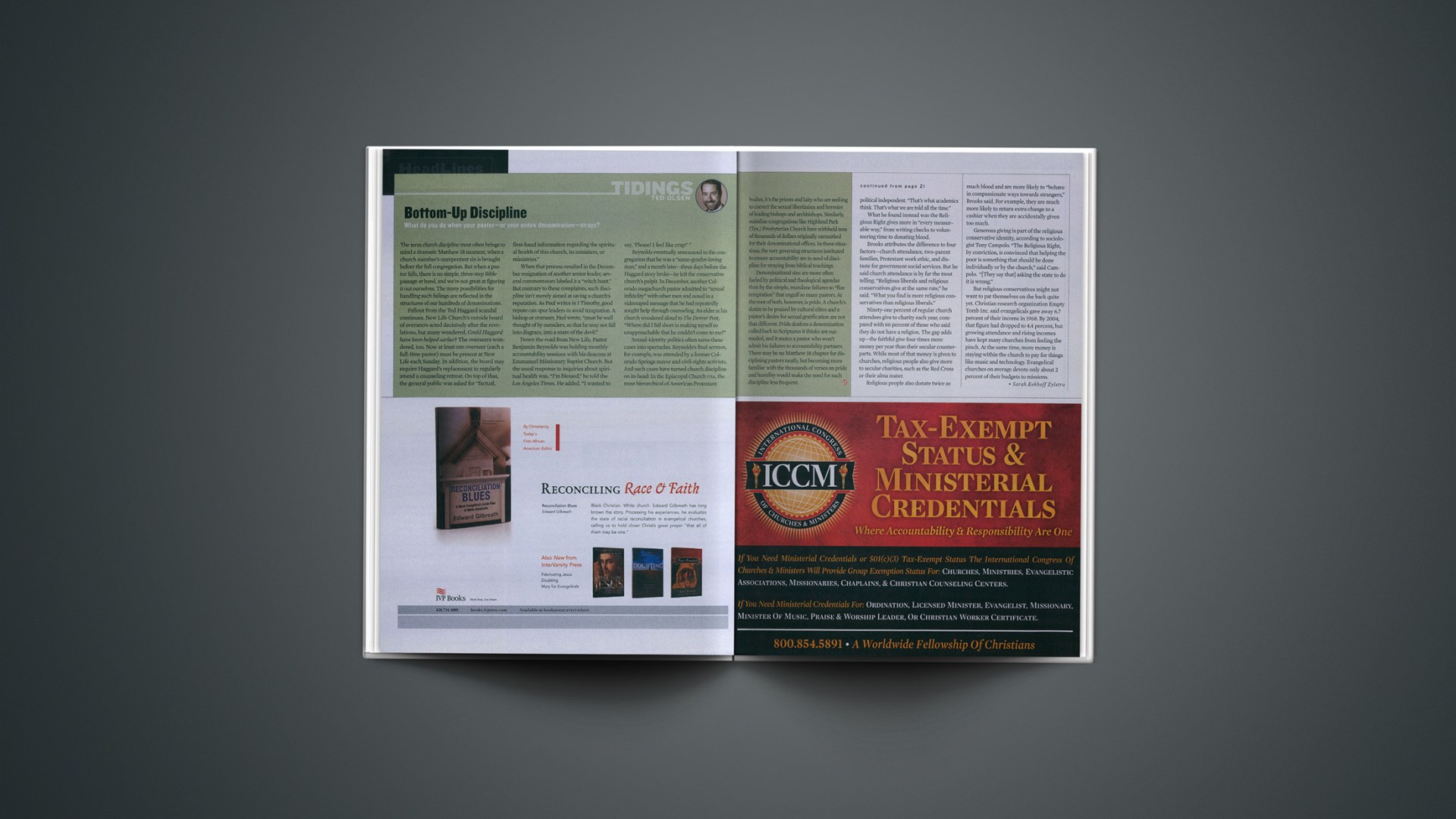The term church discipline most often brings to mind a dramatic Matthew 18 moment, when a church member’s unrepentant sin is brought before the full congregation. But when a pastor falls, there is no simple, three-step Bible passage at hand, and we’re not great at figuring it out ourselves. The many possibilities for handling such failings are reflected in the structures of our hundreds of denominations.
Fallout from the Ted Haggard scandal continues. New Life Church’s outside board of overseers acted decisively after the revelations, but many wondered, Could Haggard have been helped earlier? The overseers wondered, too. Now at least one overseer (each a full-time pastor) must be present at New Life each Sunday. In addition, the board may require Haggard’s replacement to regularly attend a counseling retreat. On top of that, the general public was asked for “factual, first-hand information regarding the spiritual health of this church, its ministers, or ministries.”
When that process resulted in the December resignation of another senior leader, several commentators labeled it a “witch hunt.” But contrary to these complaints, such discipline isn’t merely aimed at saving a church’s reputation. As Paul writes in 1 Timothy, good repute can spur leaders to avoid temptation. A bishop or overseer, Paul wrote, “must be well thought of by outsiders, so that he may not fall into disgrace, into a snare of the devil.”
Down the road from New Life, Pastor Benjamin Reynolds was holding monthly accountability sessions with his deacons at Emmanuel Missionary Baptist Church. But the usual response to inquiries about spiritual health was, “I’m blessed,” he told the Los Angeles Times. He added, “I wanted to say, ‘Please! I feel like crap!'”
Reynolds eventually announced to the congregation that he was a “same-gender-loving man,” and a month later—three days before the Haggard story broke—he left the conservative church’s pulpit. In December, another Colorado megachurch pastor admitted to “sexual infidelity” with other men and noted in a videotaped message that he had repeatedly sought help through counseling. An elder at his church wondered aloud to The Denver Post, “Where did I fall short in making myself so unapproachable that he couldn’t come to me?”
Sexual-identity politics often turns these cases into spectacles. Reynolds’s final sermon, for example, was attended by a former Colorado Springs mayor and civil-rights activists. And such cases have turned church discipline on its head: In the Episcopal Church USA, the most hierarchical of American Protestant bodies, it’s the priests and laity who are seeking to correct the sexual libertinism and heresies of leading bishops and archbishops. Similarly, mainline congregations like Highland Park (Tex.) Presbyterian Church have withheld tens of thousands of dollars originally earmarked for their denominational offices. In these situations, the very governing structures instituted to ensure accountability are in need of discipline for straying from biblical teachings.
Denominational sins are more often fueled by political and theological agendas than by the simple, mundane failures to “flee temptation” that engulf so many pastors. At the root of both, however, is pride. A church’s desire to be praised by cultural elites and a pastor’s desire for sexual gratification are not that different. Pride deafens a denomination called back to Scriptures it thinks are outmoded, and it mutes a pastor who won’t admit his failures to accountability partners.
There may be no Matthew 18 chapter for disciplining pastors neatly, but becoming more familiar with the thousands of verses on pride and humility would make the need for such discipline less frequent.
Copyright © 2007 Christianity Today. Click for reprint information.
Related Elsewhere:
A version of this column originally ran in the December 2006 print edition of Christianity Today. The column “Tidings” was formerly called “Weblog in Print.” Earlier columns by Ted Olsen include:
The Year Conservatives Saved Christmas | We bullied stores out of “Happy Holidays.” Hooray? (Dec. 8, 2006)
What Really Unites Pentecostals? | It’s not speaking in tongues. It may be the prosperity gospel (Dec. 5, 2006)
Does Islam Need a Luther or a Pope? | American pundits debate whether centralized religious authority restrains violence. (Oct. 20, 2006)
Asylum vs. Assistance | Offering sanctuary isn’t about political protest. (Sept. 26, 2006)
We’re Not Spectators | Mideast Christians writing for our website expressed their anguish—and anger. (Aug. 28, 2006)
Latter-day Complaints | Mormons and evangelicals fret over movies, politics, and each other. (Jul. 6, 2006)
Peace, Peace | From the front page to the obits, one day’s news about Christian peacemaking. (Apr. 18, 2006)










